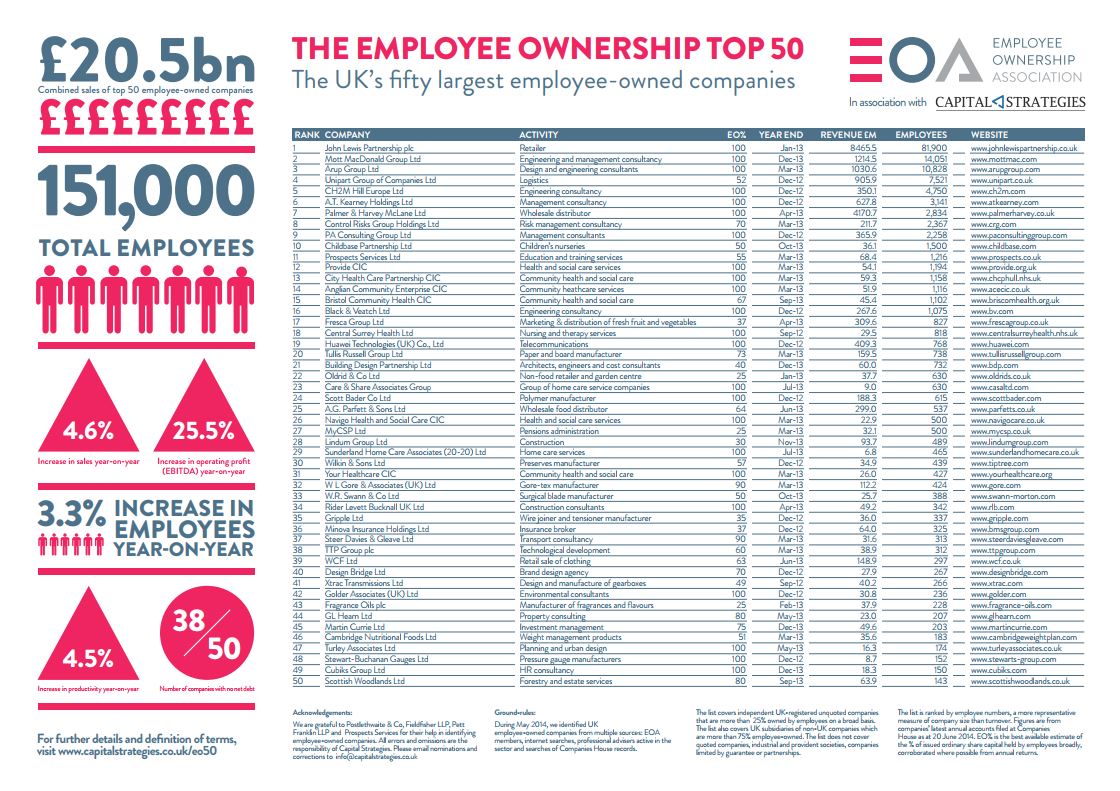Employee Ownership Top 50 2014
The UK’s 50 largest employee owned companies in 2014.
RM2 does the research for the Employee Ownership Top 50 in partnership with the Employee Ownership Association (EOA); a list of the largest fifty private employee-owned companies in the UK. You can download the infographic by clicking the link below.
Key facts (June 2014)
- The combined revenue of the top 50 employee-owned companies is £20.5 billion.
- Revenue of the top 50 increased by 4.6% year-on-year. The economy as a whole grew by 2.7% in 2013.
- Five of the largest 100 private companies in the UK are employee-owned. John Lewis Partnership is the largest private company employer in the UK. More than one in ten people employed in the largest 100 private companies in the UK are employee owners.
- The combined workforce of the top 50 employee-owned companies is 151,000. This represents 0.7% of the private sector workforce in the UK . Employee numbers increased by 3.3% year-on-year.
- The combined operating profit of the top 50 is £1.1 billion. This was an increase of 25.5% on the previous year.
- The top 50 are conservatively financed. Only 12 have net borrowings. Most have cash reserves.
- Value added per employee, which is a measure of productivity, is £47,000 and increased by 4.5% year-on-year. Productivity in the economy as a whole is flat.
The two activities most strongly represented in the top 50 are care services (ten companies) and services related to the built environment (eight companies). A number of the care service companies are spin-outs from local government or the health service.
Ground rules
Criteria for inclusion: Companies must be incorporated in the UK as companies limited by shares, unquoted, independent and at least 25% owned by employees on a broad basis. Companies may have non-UK holding companies if the UK companies are operationally independent and the non-UK holding companies are at least 75% owned by employees. Shares from joint ventures and associate companies are excluded.
Criteria for exclusion: The list does not cover quoted companies, the performance of which is tracked by the UK Employee Ownership Index. The list
also excludes co-operative businesses incorporated as industrial and provident societies as these are tracked by Co-operatives UK. The list excludes companies limited by guarantee and partnerships such as lawyers and accountants.
Data collection: Several sources were used, including internet searches, lists of EOA members, Companies House searches and professional advisers active in the sector. Figures for employee numbers and revenues are taken from companies’ latest published annual accounts at Companies House. Estimates of the percentage of employee ownership in each company were sourced from the companies’ own websites or EOA or press reports, corroborated where possible from annual returns.
Definition of terms: Operating profit or EBITDA is defined as earnings before interest, tax, depreciation and amortization. Productivity is defined as value added per employee. Value added is defined as EBITDA plus total wages. Debt is defined as the sum of bank loans and overdrafts, other short term finances and other long term finances minus cash.
[1] Sunday Times Top Track 100 published June 2013
[2] Excluding employees in the public sector and self-employed
[3] EBITDA, meaning earnings before interest, tax, depreciation and amortisation



